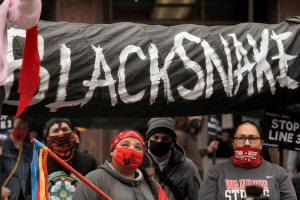Explainer: The Dakota Access Pipeline faces possible closure
 Send a link to a friend
Send a link to a friend
 [May 04, 2021]
By Devika Krishna Kumar and Stephanie Kelly [May 04, 2021]
By Devika Krishna Kumar and Stephanie Kelly
(Reuters) - A U.S. court could order the
Dakota Access Pipeline (DAPL) shut in coming weeks, disrupting
deliveries of crude oil, and making nearby rail traffic more congested.
WHAT IS DAPL?
The 570,000-barrel-per-day (bpd) Dakota Access pipeline, or DAPL, is the
largest oil pipeline out of the Bakken shale basin and has been locked
in a legal battle with Native American tribes over whether the line can
stay open after a judge scrapped a key environmental permit last year.
A federal judge ordered the U.S. Army Corps of Engineers to update the
court on its environmental review of the pipeline by May 3 and decide if
it believes the line should shut during the process.

WHAT IS THE DISPUTE?
Native American tribes long opposed to DAPL say the line endangers Lake
Oahe, a critical water source. Pipeline construction under the lake was
finished in early 2017 and the line is currently operating. But a judge
last year vacated a key permit allowing that service, raising the
possibility that the line could close while a thorough environmental
review was completed.
Dakota Access oil pipeline's operators plan to ask the U.S. Supreme
Court to intervene, according to a court filing last week.
WHAT ARE THE CHANCES THAT THE LINE WILL CLOSE?
So far, the U.S. Army Corps of Engineers has not requested the line to
be closed, even after the federal permit was canceled. It expects to
complete the environmental review by March. Market analysts believe
there is some chance the judge orders the line closed, and there is
concern about the disruption that would cause.
WHAT WILL OIL PRODUCERS DO IF THE LINE IS CLOSED?
The U.S. shale boom created more demand for rail transport of crude in
North Dakota, the second-biggest oil producing state in the country.
Outbound rail traffic rose by almost 300% between 2002 and 2015, a North
Dakota Department of Transportation report showed.
However, rail is expensive and takes longer to ship, making pipelines
the preferred shipping method. If DAPL were to shut, producers would be
pushed toward crude by rail again, BTU Analytics said.
[to top of second column]
|

Jasilyn Charger (L) listens to speakers during a protest meant for
U.S. President Joe Biden featuring Indigenous youths who live in
communities effected by the Dakota Access Pipeline and the planned
Line 3 pipeline, in Washington, U.S., April 1, 2021. REUTERS/Leah
Millis/File Photo

WHAT COULD HAPPEN FOR FARMERS IF THE LINE IS SHUT?
If shippers divert oil shipments onto railcars, it will create
transport bottlenecks in the region, especially in North Dakota,
which relies on rail to transport over 70% of its agricultural
production, economists and industry sources said.
"Probably more grain would be piled on the ground until the time it
could be moved by rail," said Jeff Thompson, a farmer in South
Dakota and a director of the South Dakota Soybean Association, which
supports DAPL.
In 2019, North Dakota led the nation in the production of all dry
edible beans, canola, durum wheat, and spring wheat. The state is a
captive rail market, which means there are no other economically
viable options to deliver agricultural products, said Stu Letcher of
the North Dakota Grain Dealers Association.
ARE RAILROADS PREPARED?
Railroads have improved load capacity over the last decade in
response to past constraints, said Bill Wilson, professor at North
Dakota State University and a member of the North Dakota Soybean
Council.
"I would be surprised that, if DAPL was shut down, that the
railroads were not capable of handling that added business," Wilson
said.
BNSF Railway, which operates the greatest number of route-miles in
North Dakota, is prepared to handle any increase in rail traffic if
the DAPL is shut, the company said.

The other major railroad serving the region, Canadian Pacific
Railway Ltd, is committed to delivering for customers across all
businesses, said spokesman Andy Cummings.
(Reporting by Devika Krishna Kumar and Stephanie Kelly in New York;
Editing by Aurora Ellis)
[© 2021 Thomson Reuters. All rights
reserved.] Copyright 2021 Reuters. All rights reserved. This material may not be published,
broadcast, rewritten or redistributed.
Thompson Reuters is solely responsible for this content. |